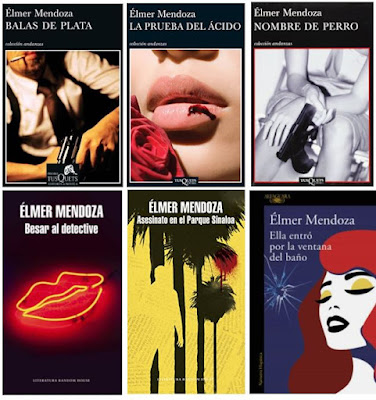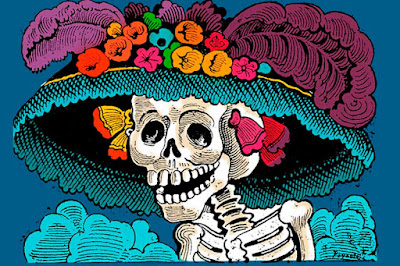"Redlogarythm for BorderlandBeat"
Disclaimer: this is an article about strictly cultural affairs. As BorderlandBeat collaborators we believe in the usefulness of a cultural scope to analyze the current Mexican panorama. That is why hereinafter there will be regular publications regarding the covering of the so called "war against cartels" from a cultural perspective involving novels, academic publications, movies and music. Please, leave in the comment sections any suggestion
 |
| Source and owner: Norman W. |
When studying the
phenomenon of the Mexican present conflict (the so called war against cartels or drug trafficking) one can see how its development has affected the country.
It´s is not just a matter of a never ending number of massacres, extortions and kidnappings
being reported day by day nor a matter of new criminal organizations appearing
into scene. The effects of the so called war against organized crime (which
formally began in 2006 under the presidency of Felipe Calderón) go beyond mere
mundane circumstances. We can feel them in the language generated in certain regions like
Culiacán or Tamaulipas, where words have been invented to name realities
nonexistant until a few years ago. We can hear these consequences in the form
of new music styles being performed by groups and orchestras all across the country. We can also see them in the form of clothing
styles and new trends adopted both by youngsters and adults. And, obviously, literature
is no exception.
Mexico has always had an enormous cultural tradition that has brought to the world´s attention the work of magnificent writers. Thus, through the pages of Juan Rulfo we felt the hellish heat in the summer of Colima as Pedro Paramo discovered a new reality riddled with ghosts. Carlos Fuentes, in "the Death of Artemio Cruz", wrote about how a young revolutionary hero devoted initially to the obtention of social justice transforms himself into a venal and corrupt local chieftain, reflecting with dreadful accuracy about the reality of the of the mid-XXth century Mexican political class. Carlos Montemayor, in his magnificent "War in Paradise", makes us feel the same apetite for change and social justice that inspires the Guerrero normalista teacher and self-made guerrilla leader Lucio Cabañas in his quest for revolution in the Tierra Caliente region. The examples of wonderful Mexican novelists are almost endless and form integral part of the great XXth Century Latin American literature, one of the most influential cultural forces in the whole world.
Nevertheless new times bring new realities, and those realities need new authors to reflect them through words. And the Mexican conflict is no exception. Thus, its is no surprise that the country has produced a new generation of authors that by means of metaphors and fictional stories do tell what journalists and professional investigators do not dare to publish. Because it is no secret that in Mexico, like anywhere else, politicians and criminals do lie to obscure the truth while artists lie to tell it.
 |
| Élmer Mendoza Valenzuela, probably Mexico´s best author regarding the noir genre |
Among the wide variety of Mexican authors writing recurrently about the war on drugs from a realistic but at the same time fictional point of view Élmer Mendoza Valenzuela (1949) shines by his own light. Born in Culiacán (one of the epicenters of organized crime in the Western hemisphere) the man who has been named as the father of “narcoliterature” initiated himself in the noble art of inventing parallel realities considerably late. Although he had published previous works in the form of short stories it was not until 1999 that he was credited with all the reputation that unfortunately for most capable human beings is scarcely recognised to those that stand out for their talents and intelligence.
 |
| A young Élmer Mendoza |
In 1999 Élmer Mendoza
published “A Solitary Assassin” (Un Asesino Solitario), which offers a
fictionalized version of the March 1994 killing of the PRI presidential
candidate Luis Donaldo Colosio from the point of view of a profesional hitman.
The incredible success of the novel granted Mendoza a solid reputation with
which he created a new character that has become a true referent not only inside
Mexico but beyond: El Zurdo Mendieta.
Edgar Mendieta aka “El
Zurdo” (Lefty) is a homicide detective of the Sinaloan Ministerial Police. Abused
by a priest during is childhood El Zurdo Mendieta combines a natural tendency
towards alcoholism, self-destruction, a never ending apetite for Mexican
cuisine and a good taste for music, literature and women with a pathologic police
instinct that allow him to take note of crucial details in the midst of a city
(Culiacán) ravaged by the conflict between criminal organizations.
Hiriently ironic, with
a bullet proof sense of humour and a considerable degree of aggressivity, El
Zurdo Mendieta solves murders not linked
to organized crime. And in the process he always crosses in the path of a
plethora of thugs; from low level hitmen, rapists and common offenders to the
heavy hitters leading the Cartel del Pacífico (a referrence to the Sinaloa
cartel) among which the beautiful and dangerous Samantha Valdés, the leader of
the group, stands out as both a rival and a friend.
Through the character of
El Zurdo Mendieta, Élmer Mendoza reflects about the paradoxes of the nation´s
tragedy. Incorruptible by nature (he chose his main collaborator, agent “Gris”
Toledo, because as a traffic policeman she fined him despite his rank) El Zurdo
has to decline multiple bribes, deal with constant death threats and defend
himself, his house and his inseparable Volkswagen Jetta gun in hand while at the
same time must ask for help to the very same criminals causing the violence he
is paid to tackle. With an open mind and a liberal spirit, El Zurdo Mendieta
also resorts to torture when a confession is needed (obtained with pleasure by
his aids El Gori and El Camello, professional tormentors) and if ofended by a
common citizen he doesn´t hesitate breaking a few noses with his Beretta´s grip.
Also through Mendieta
we are introduced to a Mexican social panorama plagued by cliches and cultural
references. His boss, the head of the Homicide Division, is an expert cooker as
well as his spouse (a clear reference to the wife of George Simenon´s greatest
figure, Inspector Maigret) El Zurdo also has a family in the United States. His
wife, who left him and took his son Jason with her, lives with El Zurdo´s
brother in California, where Jason is studying to become a FBI agent.
 |
| Élmer Mendoza during a cultural talk in the Guadalajara Reclusorio Metropolitano jail |
There are a total of
six novels featuring El Zurdo Mendieta as its main carácter. All of them are
equally brilliant and entertaining. In the first one (Silver Bullets or Balas
de Plata, 2008) El Zurdo investigates the murder of a powerful attorney, the
son of a former minister who has been killed with a silver bullet to the head.
In the second one (The Acid Test or La prueba del Ácido, 2010) El Zurdo delves
into the sinister world of Mexican feminicides and violence against women when investigating the murder of
a stripper whose corpse has appeared mutilated. In Dog Name (Nombre de
Perro, 2012) the Culiacán detective investigates the murder of the lover of the
Sinaloa´s Cartel leader and in To Kiss the Detective (Besar al Detective, 2015)
El Zurdo helpes her to escape from a hospital while at the same time has to
deal with the kidnapping of his son Jason who has disappeared in the American
side of the border. Finally, after Murder in Sinaloa Park (Asesinato en el
Parque Sinaloa, 2017) Élmer Mendoza has published his latest novel starring El Zurdo;
She Entered Through the Bathroom´s Window (Ella entró por la Ventana del Baño,
2021) in which our protagonist has to deal with the appearance of a sinister
criminal organization led by a former Army general (a clear reference to Los
Zetas) trying to conquer the State of Sinaloa.
 |
| El Zurdo Mendieta´s novels. Most of them can be found in hispanic countries, although several English version can also be found |
But Mendoza´s work has
trascended the figure of the classical homicide detective and his novels also
cover different aspects of the Mexican society. In The Lover of Janis
Joplin (El Amante de Janis Joplin, 2001) David Valenzuela, a slightly mentally
retarded youngster from the Golden Triangle accidentally kills the
brother of a criminal local boss and has to abandon his hometown pursued by
the vengeance of the traffickers. With his older brother leading and urban
guerrilla group in the Pacific Coastal area, David travels to California where
he knows Janis Joplin by chance and fells in love with her. I remember reading
this book in the summer of 2016 and the last part of it, specially its stark
ending, won´t leave anyone detached.
Élmer Mendoza has also
created a second recurring character, Capi Garay, a 18 year old teenager from
Culiacán characterized by his maturity and his inability to restrain himself of
falling in love with any girl crossing his path. Through this figureÉlmer
Mendoza analyzes the thoughts, hopes and concerns of a normal Mexican
teenarger; always caught in the middle of a country that offers so much and so little
at the same time. Thus, in the novel The Mystery of the Skull Orchid (El
Misterio de la Orquídea Calavera, 2014) Capi Garay has to travel to the park of
Las Pozas, an incredible architectural complex created in the late 1940s by the
surrealist artist Edward James located in Xilitla, San Luís Potosí, where his
grandfather has been kidnapped by a gang asking for a millionaire sum. There he
will meet a witch trying to kill anyone entering a magic garden, a boy who owns
a snake as a pet and, naturally, a girl with which he´ll fall in love. There is a second novel written by Elmer Mendoza about Capi Garay´s adventures (The Fourth
Question, La Cuarta Pregunta, 2019) but since I haven´t read it yet I won´t
make any statements about its content.
 |
| Las Pozas de Xilitla, San Luís Potosí. A wonderful surrealist garden created by Edward James and main scenario for Mendoza´s The Mystery of the Skull Orchid |
Elmer Mendoza stands out as one of Mexico´s current greatest novelists. His talent relies not only in the fact that organized crime always orbitates around each plot permeating the storyline and explaining al the mysteries having to be solved, but also in his use of words to create in the reader´s mind a complex and wide variety of flavors, feelings and sounds.
He has also made an
incredible use of the new types of languages created by the effects of
organized crime. In fact, to read his novels one has to forget about the rules of
formal Spanish and exercise his/her imagination as each page reflects a
combination of Spanish, English and local expressions making his characters look much more credible and at the same time exotic. As he said in a 2018 interview,
“I try to catch readers and make them to forget about words so they continue
reading even if it´s complicated. In the region I´m from (Sinaloa) they have a
particular way of naming a lot of things and its origins are in organized
crime. These words allow me to create a convenient narrative atmosphere”.
The success of Elmer
Mendoza in the field of literaure is undisputable and he himself has spoken
openly about the effects of writing about the current state of affairs. As he
said in 2018 “in Mexico it is easier to write about narcos rather than
politicians (…) These are delicate affairs, and if anyone dares to write novel
using a politician as story line he could be in trouble (…) The narcos aren´t
vengeful in the field of literature. We don´t have any information of what´s
the effet of literature in them”.
 |
| Élmer Mendoza (left) and Javier Valdez (right), Culiacán, September 29th 2014. |
To be fair we should
agree with Mendoza about the difficulty of imagining El Mencho reading a novel rather than
watching a boring and over-acted TV series, but who knows, maybe the day he is
caught (if this finally happens) someone finds one of El Zurdo´s novels by his
bedside. In the words of Elmer Mendoza himself “in Mexico everything is possible”.












Damn, where did you come from? This is great. I got sent Nombre De Perro a few weeks ago, still haven't got round to it, but I will now. (As for suggestions, Noria Research Mexico is a great resource, data driven but very specific and localised)
ReplyDeleteI come from the night of time, where injustice is beaten by the use of force and lies are removed by the weight of hope jajaja. Regarding Nombre de Perro, wonderful book. Found the solving of the dentist´s murder pretty entertaining and funny (as you will see) As any novel of Mendoza it´s pretty awesome.
Delete"That is why hereinafter there will be regular publications regarding the covering of the so called "war against cartels" from a cultural perspective involving novels, academic publications, movies and music. Please, leave in the comment sections any suggestion "
ReplyDeleteThis section is a great addition. Feel free to use my material on narcoliterature or narcocorrido.
https://sdsu.academia.edu/JuanRamirezPimienta
Thanks man, great intakes into the movimiento alterado I see
DeleteIf they believe in the angel of death as a helper they will surely die quick
ReplyDeleteStupid answer. The kind of comment the classic retarded kid we all had in our classroom would carve in the bathroom´s door with a knife before slicing his finger by accident. Do society a favor and visit a public library
DeleteI thaight Elver last name was Gero
ReplyDeleteOne small mistake by Elme, r and mayo and his political connections will send him to drink tea with chalino Sanchez and Javier Valdez
ReplyDeleteGreat read. Keep up the writing sir. What is next in the series?
ReplyDeleteSOUND'S LIKE HIS BOOK'S R A GREAT READ ALMOST LIKE CHARLES BOWDEN BUT FIKTION GOTTA GET HIS BOOK'S N FIND OUT MY PEOPLE'S 🙋🏿♂️🤦🏿♂️🤷🏿♂️🤷🏿♂️
ReplyDeleteThank you for this profile. We don’t hear enough about Mexican literature here in the US.
ReplyDelete